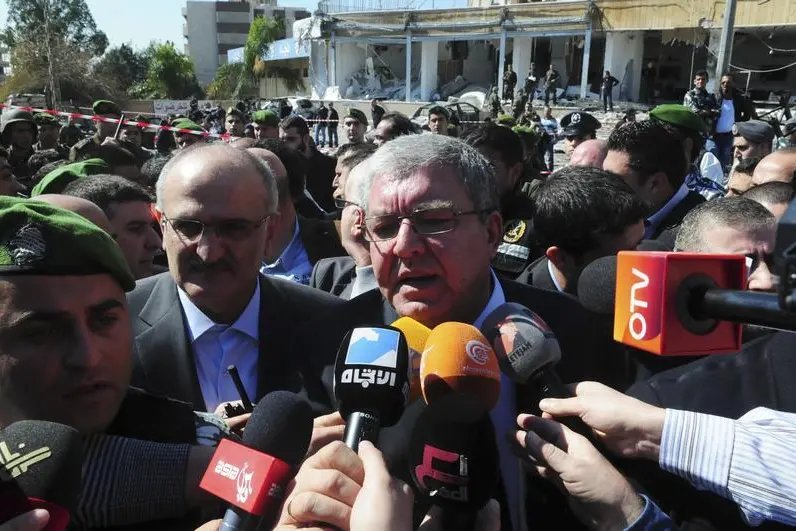PHOTO
Monday, Sep 12, 2016
Beirut: Several days after Judge Ala’a Al Khatib issued a detailed indictment of two Syrian intelligence officers who apparently supervised the August 23, 2013 bombings of the Al Taqwa and Al Salam mosques in Tripoli, the Lebanese Minister of Interior, Nouhad Al Mashnouq, announced that he submitted a proposal to the Cabinet to disband the Tripoli-based Arab Democratic Party (ADP) and a faction of the Islamic Unification Movement (IUM) because both groups played critical roles in the blasts.
Speaking in Dhour Al Abadiyeh, a town in the Aley district, Mashnouq said that “the era of shy justice has ended and the era of settlements at the expense of people’s blood is gone”.
“The era of blackmailing us with civil peace has also ended,” he continued, as he revealed that he had signed a request and submitted it to the council of ministers.
An ADP official, Ali Fidda, took to the airwaves after Mashnouq spoke and told the LBC television station that this was a political decision, “part of the overbidding between him and [resigned Minister of Justice Ashraf] Rifi,” claiming that “the indictment has acquitted [the ADP]”. Mimicking Fidda, an anonymous March 8 source labelled Mashnouq’s decision in remarks to the MTV News channel as “overbidding” too, adding that “it will not pass in Cabinet”.
In his own press conference, Rifi revealed that he would “exceptionally take part in any cabinet session that has the resolution to disband the two parties on its agenda” and, presumably, cast his vote to ban both the ADP and the IUM. Still, it was unclear whether the Cabinet would want to consider this fresh conundrum.
Lebanon’s highly polarised elites are divided between pro-and anti-Bashar Al Assad groups, which adds to prevailing tensions, and that inevitably delay any settlements on a variety of concerns.
As a further illustration of this elite-made dilemma, the mayor of Majdal Anjar town in the Biqa‘ Valley, Saeed Yassin, called on the state to dissolve the Arab Tawhid Party (ATP) too. Yassin determined that the ATP, which he called a source of “terror”, cannot hide behind its charismatic founder’s shadow but must be held accountable for its deeds.
This call, prompted by the explosion that wounded three young girls earlier last week in the sleepy town, drew a sharp rejoinder from the ATP chairman, Wiam Wahhab, who rejected any accusations that one of his bodyguards was responsible for the incident. On Friday, Internal Security Forces’ Information Branch arrested Hesham Bu Diab in the Shuf district village of Jahiliyyah, which is also Wahhab’s hometown, that prompted Yassin to issue his request.
The Tawhid Party released a statement saying that they were confused by Yassin’s “inflammatory campaign”, affirming that the ATP condemned “any actions that harm the nationalistic people of Majdal Anjar, who have nothing to do with the positions of Yassin and his false accusations”.
Ironically, Wahhab distanced himself from Bu Diab, saying that he was only a party supporter rather than a bodyguard, even if photographs and videos were broadcast to show him in proximity to the Druze leader.
Many Lebanese wondered whether Prime Minister Tammam Salam was prepared to place the disbanding of various groups and parties on the agenda of the Cabinet, aware that this may add to the woes that burden his government, as he struggles to keep his ship afloat in the aftermath of the Free Patriotic Movement shadow coup d’etat that has kept eight of his 24 ministers away from weekly meetings.
By Joseph A. Kechichian Senior Writer
Gulf News 2016. All rights reserved.





















